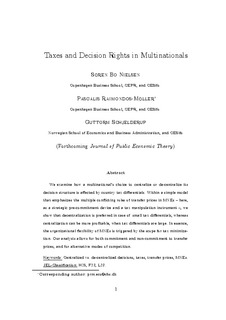| dc.contributor.author | Nielsen, Søren Bo | |
| dc.contributor.author | Raimondos-Møller, Pascalis | |
| dc.contributor.author | Schjelderup, Guttorm | |
| dc.date.accessioned | 2007-06-20T11:49:22Z | |
| dc.date.available | 2007-06-20T11:49:22Z | |
| dc.date.issued | 2007 | |
| dc.identifier.issn | 1500-4066 | |
| dc.identifier.uri | http://hdl.handle.net/11250/163885 | |
| dc.description.abstract | We examine how a multinational’s choice to centralize or de-centralize its decision structure is affected by country tax differentials. Within a simple model that emphasizes the multiple conflicting roles of transfer prices in MNEs — here, as a strategic pre-commitment device and a tax manipulation instrument —, we show that decentralization is preferred in case of small tax differentials, whereas centralization can be more profitable, when tax differentials are large. In essence, the organizational flexibility of MNEs is triggered by the scope for tax minimization. Our analysis allows for both commitment and non-commitment to transfer prices, and for alternative modes of competition. | en |
| dc.language.iso | eng | en |
| dc.publisher | Norwegian School of Economics and Business Administration. Department of Finance and Management Science | en |
| dc.relation.ispartofseries | Discussion paper | en |
| dc.relation.ispartofseries | 2007:11 | en |
| dc.subject | centralized vs. de-centralized decisions | en |
| dc.subject | taxes | en |
| dc.subject | transfer prices | en |
| dc.subject | MNEs | en |
| dc.title | Taxes and Decision Rights in Multinationals | en |
| dc.type | Working paper | en |
| dc.subject.nsi | VDP::Samfunnsvitenskap: 200::Økonomi: 210::Bedriftsøkonomi: 213 | en |
